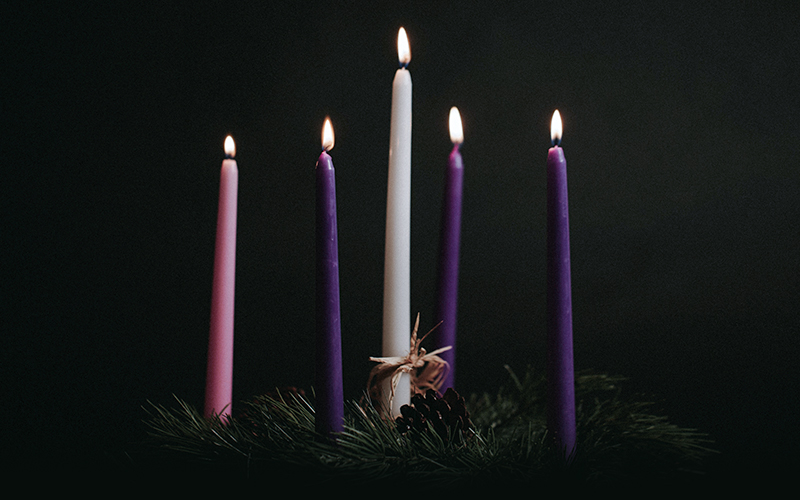Text: Isaiah 9:1-7, Luke 2:1-20
“You keep him in perfect peace whose mind is stayed on you, because he trusts in you.” —Isaiah 26:3
How can I find peace in a world rife with war, hatred, violence, and suffering? Or as someone said to me, “It’s hard to be at peace when it feels like all of humanity has lost its humanness.” Peace is something we all want, yet few seem to find.
As churches around the world are lighting the advent candle of peace today, it’s important to consider what peace is, and what it isn’t. It is a gift from God, and therefore cannot be manufactured by man. Even if political leaders leveraged all their power to end all the military conflicts in the world today, that would not permanently remove chaos from the hearts of man. It would only be a pseudo, fragile, external, and temporary peace, until those hearts raged again as we’ve seen repeated throughout history.
The Hebrew word for peace is shalom. This word occurs over 250 times in the Old Testament. It refers to relationships between people (Genesis 34:21), nations (1 Kings 5:12), and God with men (Psalm 85:8). In the New Testament, God commands us to seek peace (Psalm 34:14; Matthew 5:9), and we should “make every effort to do what leads to peace” (Romans 14:19). We are also reminded that there is no peace for the wicked (Isaiah 48:22).
Peace is a gift from God. Peace is NOT dependent on external circumstances; it is the fruit of internal connection—more specifically the result of abiding in the word of God and resting in the presence of the Holy Spirit in our hearts. This is real and lasting peace, that which carries the meaning of completeness or well-being. We get this peace by putting our faith and trust in Jesus, and we abide in that peace by daily leaning upon Him rather than our own understanding (Proverbs 3:5-6).
Humanity lost peace with God when sin entered the world. From the moment that Adam and Eve ate the forbidden fruit in the Garden of Eden, all of humanity became sinners (2 John 1:8). This put us in conflict with God. The “flesh,” in the sense of sinful desires, became what we follow (Romans 8:7-8). No human being, since Adam and Eve, has been righteous (Ecclesiastes 7:20), which means we are all in a state of rebellion against God. This lack of peace presented a dilemma that the Messiah came to solve.
When Isaiah prophesied in ancient Israel about a future Messiah, or Savior, he declared:
“For a child will be born to us, a son will be given to us;
And the government will rest on His shoulders;
And His name will be called Wonderful Counselor, Mighty God,
Eternal Father, Prince of Peace” (Isaiah 9:6).
Advent reminds us that peace is the direct correlation of being in a right relationship with the “Prince of Peace,” the Jesus who promised a peace that transcends the chaos (John 14:27) and surpasses all understanding (Philippians 4:7). The embodiment of peace isn’t packaged in a pill or a bottle on some shelf at the pharmacy but came to us as “a baby wrapped in swaddling cloths and lying in a manger.” This newborn Prince of Peace was also called Immanuel, meaning “God with us.” He came to shed His blood for our reconciliation with God, to pay the penalty for our sins and to make us a new creation clothed in His very own righteousness. He desires to establish His kingdom rule in our hearts and governing reign over our daily lives.
God doesn’t offer us a pseudo, fragile, temporary, or surface peace, He offers us true, lasting, and indomitable peace. Are you experiencing that peace today? If not, advent is a great time for surrender. Will you wave your white flag today, and yield your life to God’s control? His gift of eternal peace is available right now.
PRAYER
Heavenly Father, thank you that there is a peace that surpasses understanding. You promised that I can know that peace, found in the person of Jesus. Prince of Peace, rule in my heart today. I relinquish control. I confess my sins. I surrender shame, guilt, regret, anger, depression, anxiety, and anything that rivals the peace you have promised. I receive your peace as a gracious gift, one that may well be the best gift I can receive this Christmas. In Jesus’ name, Amen.
Questions for Personal Reflection or Group Discussion:
- If you could sleep out under the stars anywhere in the world, where would you put down your pillow?
- What message did the angel tell the shepherds? (Luke 2:10, 12) How do you think God might translate that message directly toward your circumstances, fears, or worries today?
- What does it mean that Mary “treasured up all these things and pondered them in her heart”? What is required to transfer head knowledge about peace into real life experiences with peace?
- What is the responsibility of those who “discover” the good news about Jesus and his embodiment of peace?
- Where do you need to shift your focus so that you can live in the fullness of God’s shalom this Christmas season?





Text: Isaiah 9:1-7, Luke 2:1-20
“You keep him in perfect peace whose mind is stayed on you, because he trusts in you.” —Isaiah 26:3
How can I find peace in a world rife with war, hatred, violence, and suffering? Or as someone said to me, “It’s hard to be at peace when it feels like all of humanity has lost its humanness.” Peace is something we all want, yet few seem to find.
As churches around the world are lighting the advent candle of peace today, it’s important to consider what peace is, and what it isn’t. It is a gift from God, and therefore cannot be manufactured by man. Even if political leaders leveraged all their power to end all the military conflicts in the world today, that would not permanently remove chaos from the hearts of man. It would only be a pseudo, fragile, external, and temporary peace, until those hearts raged again as we’ve seen repeated throughout history.
The Hebrew word for peace is shalom. This word occurs over 250 times in the Old Testament. It refers to relationships between people (Genesis 34:21), nations (1 Kings 5:12), and God with men (Psalm 85:8). In the New Testament, God commands us to seek peace (Psalm 34:14; Matthew 5:9), and we should “make every effort to do what leads to peace” (Romans 14:19). We are also reminded that there is no peace for the wicked (Isaiah 48:22).
Peace is a gift from God. Peace is NOT dependent on external circumstances; it is the fruit of internal connection—more specifically the result of abiding in the word of God and resting in the presence of the Holy Spirit in our hearts. This is real and lasting peace, that which carries the meaning of completeness or well-being. We get this peace by putting our faith and trust in Jesus, and we abide in that peace by daily leaning upon Him rather than our own understanding (Proverbs 3:5-6).
Humanity lost peace with God when sin entered the world. From the moment that Adam and Eve ate the forbidden fruit in the Garden of Eden, all of humanity became sinners (2 John 1:8). This put us in conflict with God. The “flesh,” in the sense of sinful desires, became what we follow (Romans 8:7-8). No human being, since Adam and Eve, has been righteous (Ecclesiastes 7:20), which means we are all in a state of rebellion against God. This lack of peace presented a dilemma that the Messiah came to solve.
When Isaiah prophesied in ancient Israel about a future Messiah, or Savior, he declared:
“For a child will be born to us, a son will be given to us;
And the government will rest on His shoulders;
And His name will be called Wonderful Counselor, Mighty God,
Eternal Father, Prince of Peace” (Isaiah 9:6).
Advent reminds us that peace is the direct correlation of being in a right relationship with the “Prince of Peace,” the Jesus who promised a peace that transcends the chaos (John 14:27) and surpasses all understanding (Philippians 4:7). The embodiment of peace isn’t packaged in a pill or a bottle on some shelf at the pharmacy but came to us as “a baby wrapped in swaddling cloths and lying in a manger.” This newborn Prince of Peace was also called Immanuel, meaning “God with us.” He came to shed His blood for our reconciliation with God, to pay the penalty for our sins and to make us a new creation clothed in His very own righteousness. He desires to establish His kingdom rule in our hearts and governing reign over our daily lives.
God doesn’t offer us a pseudo, fragile, temporary, or surface peace, He offers us true, lasting, and indomitable peace. Are you experiencing that peace today? If not, advent is a great time for surrender. Will you wave your white flag today, and yield your life to God’s control? His gift of eternal peace is available right now.
PRAYER
Heavenly Father, thank you that there is a peace that surpasses understanding. You promised that I can know that peace, found in the person of Jesus. Prince of Peace, rule in my heart today. I relinquish control. I confess my sins. I surrender shame, guilt, regret, anger, depression, anxiety, and anything that rivals the peace you have promised. I receive your peace as a gracious gift, one that may well be the best gift I can receive this Christmas. In Jesus’ name, Amen.
Questions for Personal Reflection or Group Discussion: